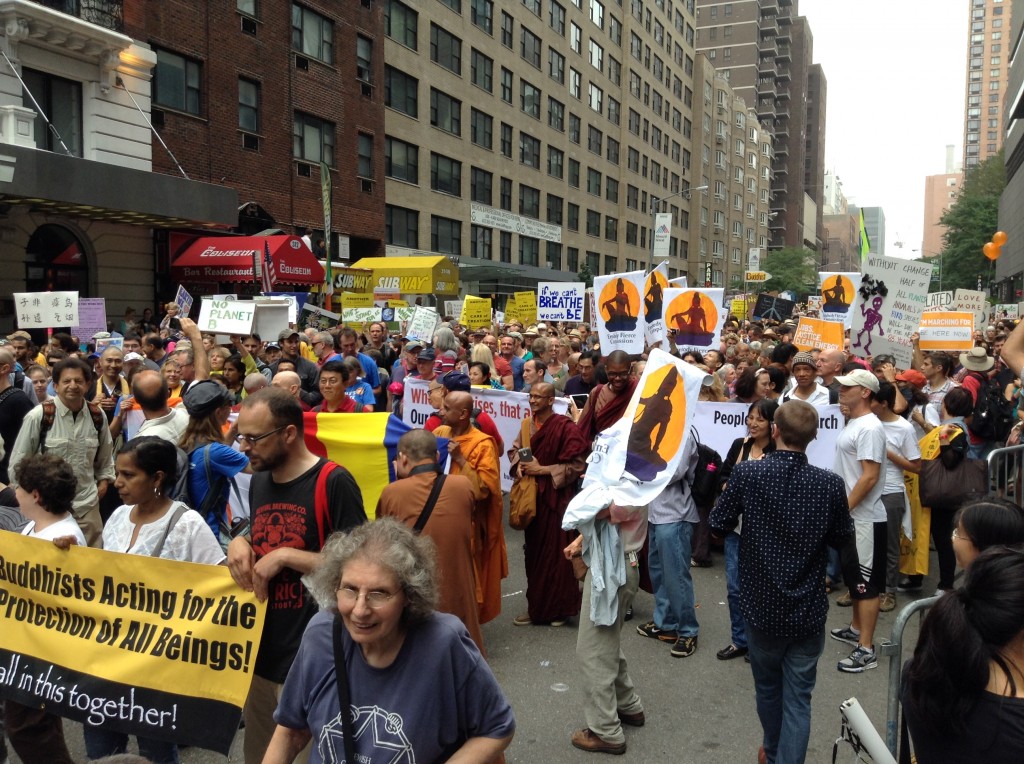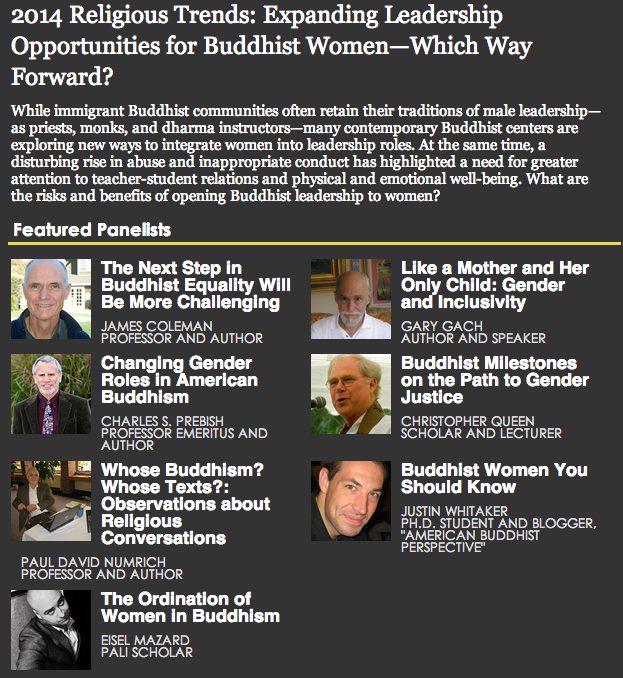Joshua Eaton is the editor, writer, and translator who founded the visionary Dana Wiki (www.danawiki.org) — an online resource meant to aid Buddhist Americans in community service work. A graduate of the Master of Divinity in Buddhist Studies program at the Harvard Divinity School, he also served as editor-in-chief of Cult/ure: The Graduate Journal of Harvard Divinity Schoolduring his time at the institution. Today, among other things, he is a contributing scholar at the Journal of Inter-Religious Dialogue’s State of Formation. Joshua is also an active, must-follow Twitterer @joshua_eaton.
In addition to all this good work, Joshua has been a steady, devoted Buddhist presence in the Occupy Wall Street movement. I’ve wanted to do more about Buddhism and #Occupy, and knowing Joshua to be a great interview, I couldn’t resist asking him to spend some time talking to us about the two. What follows is our e-conversation.
On behalf of our readers… Thank you, Joshua — and keep up the great work!
*
First of all, could you tell us a little bit about your own involvement in the Occupy movement?
I’ve been involved with Occupy Boston since its first General Assembly, before there was even a camp. I didn’t actually camp much when we had an encampment, but I was there almost every day. I’ve been most active with Occupy Boston’s Media Working Group, where I help out with social media generally try to help keep things organized. I’ve also been planning some autonomous direct actions with members of the Protest Chaplains, whom you might have heard of. We put on a live-action, Occupy-themed nativity play at the site of Occupy Boston’s evicted camp for Christmas, and we’re planning some things for Lent, as well. I’ve been pretty active with Occupy Harvard, as well, though less so recently.
Aside from Occupy Boston and Occupy Harvard, I’ve spent some time with Occupy Ottawa and made a lot of connections there. I’ve also been to Occupy UMass-Boston and Occupy Kingston Ontario. (Unfortunately, I haven’t been to Occupy Wall Street yet.) Right now I’m working on a couple of articles about Buddhism and the Occupy movement, which is a topic that I also tweet about from @OccupyBuddhism.
This is very broad question, but let’s see where it takes us. From your vantage point, why should Buddhists care about and/or get involved with the Occupy movement?
My first response is personal. I grew up in a working-class, single-parent household and was the first member of my family to graduate from college. Afterward I was fortunate to get a full scholarship to the Master of Divinity program at Harvard University. I’ve just now found steady, full-time work after graduating in May 2010. And I was mostly looking for clerical work rather than work related to my degree. Like a lot of people my age, I’m afraid that we no longer live in a country where upward mobility is a real possibility. There are a lot of stories out there like mine. Most are even worse. The American middle class has been slowly disappearing for forty years now. That ought to concern everyone.
Buddhists aren’t any different. If our practice gives us an identity that sets us apart from others—whether they be our friends, our classmates, the people we work with, or our fellow Americans—then it isn’t working. In fact, it’s doing the opposite of what it should do. My primary teachers are always emphatic on this point: our practice should make us ordinary, down-to-earth, simple, and engaged with the world around us. It should make us more human, not less
My second response is intellectual. Buddhism relies on society for its continued existence. Even monastics, who intentionally withdraw from social institutions, depend on lay disciples for their physical needs. Dharma centers depend on their members for financial support and volunteer work. Teachers depend on students for their livelihood. In order for Buddhism to be healthy, society has to be healthy. It cannot exist in some rarified spiritual bubble that’s isolated from society’s problems. If we want the seed of the dharma to sprout and grow in the West, then we have to plant it in good soil.
This is basic interdependence. It’s why the Buddha often gave financial advice to his lay students. It’s why the Buddha and other teachers who came after him so often advised kings on what social and economic policies would be most virtuous. We don’t often hear about these teachings on politics and economics, but there are just tons of them in every school. Buddhism also preserved and transmitted a lot of medical knowledge as it moved throughout Asia. This is because people have always recognized that you need a healthy body and a healthy society to practice the dharma. This body, this society—there’s nowhere else for us to practice, nowhere else for us to escape to, nowhere else for us to go.
What resources in the Buddhist traditions have been helpful/inspiring/motivating for you in terms of thinking about economic justice?
There are several scriptures and other texts that have helped me connect Buddhism and economic justice. One example is chapters 3 and 4 of Nagarjuna’s Precious Garland. Among other things, Nagarjuna tells the king to whom he’s writing to implement universal health care, to build public works, not to overtax his subjects, not to hinder foreign merchants, to implement restorative criminal justice, to abolish capital punishment, and to live a simple and modest life devoted to his subjects.
I’m actually writing an article about Buddhism and the Occupy movement right now based on one of my favorite texts, the Scripture Requested by Surata. In it, the bodhisattva Surata walks into the middle of the royal treasury and upbraids the king of Sravasti for his greed, arrogance, and failure to protect the poor. It’s a really beautiful text, despite the fact that it’s largely unheard of.
The teachings on karma and dependent origination have helped a lot, too. Everything that exists and everything that happens relies on causes and conditions. That isn’t just an expression; causes and conditions are two separate things. Take the example of a flower. The cause is the flower seed and the conditions are the right soil, the right amount of sunlight, the right amount of water, the absence of pests that would destroy the sprout, etc. The flower could not exist without either.
Similarly, we all carry with us both very good and very bad karmic seeds. When and how they ripen depends on all of these other conditions, both internal and external. Poverty is one of those conditions. A healthy, prosperous society is, too. So we need to pay attention not just to the seeds we’re planting but also to the soil we’re planting them in, to how much we’re watering them, to how much sunlight they need, all of those things. Peter Maurin, the co-founder of the Catholic Worker Movement, use to say that he wanted to create a society where it was easier for people to be good. We can discuss what sort of society creates the best conditions for virtuous seeds to sprout and flourish, but I know one thing: it’s not a society with lots of poverty, gross wealth inequality, few opportunities, and little upward mobility.
Finally, let me say something about “economic justice.” It’s the most readily available and convenient term in English for what we’re talking about, but I’m not certain that it’s the most accurate. A lot of Buddhist writings focus just as much on how good it is for the ruler to be less greedy and callous as they do on how good it is for the subjects. They aren’t as much about what’s right as they are about what brings out the fullest potential of everyone involved. Instead of “social justice,” perhaps we should say “social virtue” or “social flourishing.” I don’t think this means we have to stop saying “we are the 99%,” because most of us who say that are. We just have to start being the 99% who know that what’s best for the 99% is best for the 1% too. And we have to start telling the 1% that.
There has been a lot of writing recently about next steps in the Occupy movement and so on. Looking to the future, what do you see happening next?
I should confess that I’ve put a lot more time and thought into the practical, day-to-day operations of Occupy Boston than into the bigger picture. I might be able to say a couple of things, though.
First, I don’t think there’s any way we won’t see a lot of re-occupations come spring. I think they’ll be much, much wiser, too. As one of my friends often says half-jokingly, “The next time we set up a tent city in the middle of a financial district, we’re going to do it so much better!”
Second, I think that a combination of the winter and losing our encampments has made a lot of occupations much more inward-focused. This may have been necessary to some extent, but I hope we’ll begin to pivot to a more outward focus. In particular, I hope that occupations will begin to engage in more and more marches, rallies, and other nonviolent direct actions. And I hope we’ll refocus on issues of economic justice, as important as related issues are.
What I just said about nonviolence and economic justice are at the forefront of my hopes for this movement. This year has already seen street violence in Oakland, thought it’s important to note that the Oakland Police Department is in danger of being placed into federal receivership because of their ongoing pattern of brutality. The G8 and NATO summits in Chicago, the DNC, and the RNC are still ahead of us. They all risk devolving into the violent black-bloc tactics that marked the late 90s anti-globalization movement.
It goes without saying that violence against people or animals is totally out of the question. I don’t actually oppose destruction of property, in principle. Still, I think it should be reserved for (1) extreme situations where it is necessary to defend human life, or (2) small, controlled protests like destroying nuclear warheads or burning draft files. Black bloc tactics are neither. They dehumanize the police, who don’t need any help in that department. They frighten and intimidate bystandards. They put nonviolent protestors at much greater risk of police brutality. They’re wrong, plain and simple. On a more practical level, smashing up storefronts and waging pitched street battles with the police will dry up all our popular support and destroy our movement. We cannot go down that path if we have any hope of creating a better world.
In addition, the people who are the most endangered by black bloc actions are the same people most hurt by economic injustice: poor and working-class people, undocumented immigrants, teenagers, LGBT people, and people with a history in the legal system. Those are the people we least want to hurt, and they’re the people most at risk when black bloc protestors co-opt nonviolent actions.
The focus on economic justice is also critical. We live in a country that talks about race and gender a lot, even if we are bad at it. We almost never talk about class as a separate category. This was a huge problem for me while I was at Harvard. My courses spent a lot of time on race and gender, which is part of Harvard Divinity School’s mission statement. Class was absent, both from the mission statement and from the curriculum. Unlike most of my former classmates, I don’t come from a middle-class background. That made me feel isolated and angry from the moment I stepped on campus. There was no place for me to talk about that, and no one gave me any words to talk about it in. For a while it made me hostile toward the women’s groups on campus. I could never figure out why until I joined Occupy Boston. As soon as I had an outlet to talk about my experiences with class all that anger toward feminists just melted away. I think talking about class is integral to struggles against racism and sexism because ignoring it just breeds racial and gender hostility. Occupy Boston has been healing for me in that regard. The Occupy movement can heal our country in the same way, if we’ll let it.
Other than simply “come Occupy with us,” what recommendations would you have for sympathetic readers who might want to support the movement somehow?
First of all, people’s prayers, dedications of merit, positive aspirations, and well-wishes are always welcomed. Just hearing people say “thank you” makes all of the frustration, all of the sleepless nights, and all of the hard work worth it.
Secondly, a lot of occupations have seen a drop in funding now that their camps are gone. Ironically, this is right when they need funding the most for indoor office and meeting space. So, if people have the means to give a little money to their local occupation, no matter how small, that would be amazing.
Third, we need prophetic witness within the Buddhist community. We need Buddhists willing to take a public stand against the truly awful things that are happening in our society, as the bodhisattva Surata did in his. This could mean showing up to a protest in dharma robes. It could taking your meditation group to a march and holding a banner with the group’s name on it. It could mean convincing your dharma center to move its money to a local credit union. It could mean, if you are a monastic or a teacher, joining a local clergy organization that does advocacy work. Bhikkhu Bodhi, who really is an American Surata, has been so singular at Occupy Wall Street. We need more courageous voices like his.
I couldn’t agree more — especially about Bhikkhu Bodhi. Thank you, Joshua.












